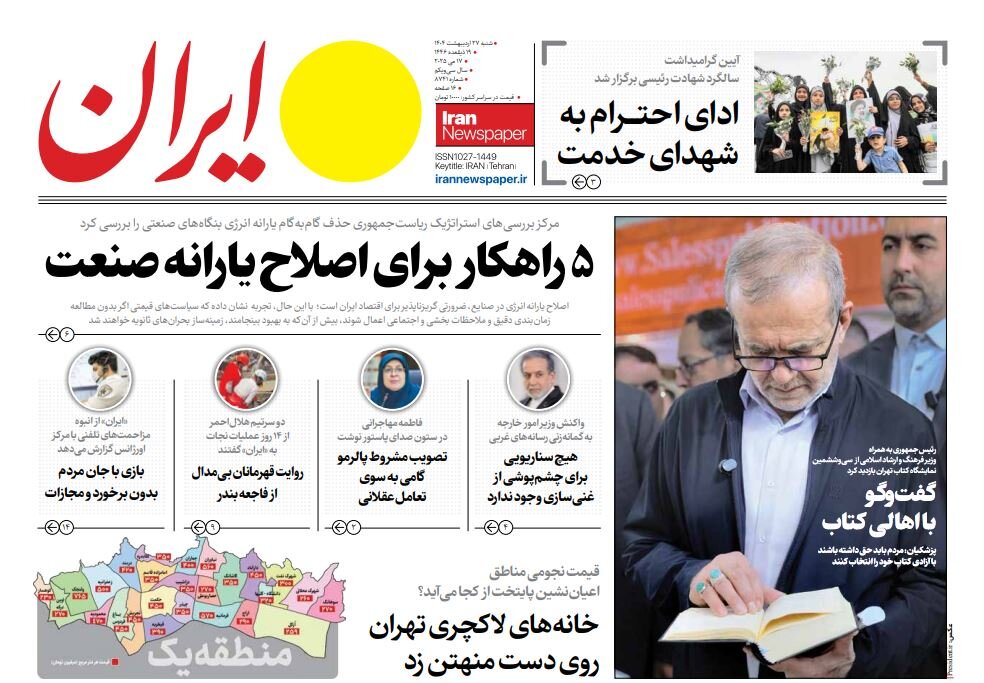Tehran – In commentary, the Iranian newspaper looked into support for Arab countries’ nuclear talks, and while US President Donald Trump had begun a trip to the Persian Gulf, Saudi Minister Bin Fahan quietly but meaningfully supported a sensitive (nuclear) speech between Tehran and Washington.
He expressed his hope that the consultation would end with a positive outcome. This is a short sentence from a historical period with significant significance. The reason for such a stance was mainly due to Araguchi’s approach, and he said he was very interested in understanding the local area of the lecture. Saudi rulers are trying to break out of past heavy and expensive alliances, looking at new regional equations and redefine their friends and enemies. With this new model, Iran is no longer a threat. Rather, they could become rivals who can manage their differences. Unlike in previous periods, local experts say, we have witnessed an unprecedented level of political support for Iran from the region’s Arab countries. Arab countries learn that in the Middle East there is no path to peace except through understanding.
Ettelaat: Iran and the US are closer to contract than ever
Etterat sought the views of political analyst Hassan Hanizadeh on Donald Trump’s contradictory statement on Iran. Hanizadeh said: Donald Trump has repeatedly made contradictory statements and is known for being a controversial figure for this reason. So, recently, when Iran and the United States were negotiating, he told one day about his interactions with Iranians, and the next day he says that Iran is pose a threat and playing a destructive role. Therefore, Iranian diplomats negotiating with the US must be wary of not being fooled by them. Previous Iran-US negotiations have sent positive signals that raise hopes for the agreement to be realized. In any case, there are many small and major issues between Iran and the United States. If Tehran and Washington argue their views, even a minimal agreement is not the case. However, observations show that Iran and the United States are closer to an agreement than ever before.
Hamshahri: A psychological battle instead of negotiation
In the memo, Hamshari pointed out American rhetoric rather than the right path to negotiation, writing: Iran is strong intent to reach a consensus, but the US has yet to announce its position on effective lifting of sanctions, except for rhetoric and psychological games. Iran and the US are holding indirect negotiations for the fourth round, with media reporting on the wishes and demands of the parties. Iran has announced that if sanctions are effectively lifted, it is ready to win an agreement and comply with some of the US demands, but Washington has not shown any willingness to lift the sanctions. It simply relied on psychological warfare and generalization. Long before the indirect talks began, Trump’s most important technique for pressure Tehran to achieve the White House goals at the negotiation table was to present the governing system of the Islamic Republic, particularly its defense/nuclear doctrine. This indication of intent can also be seen during Trump’s speech at the Riyadh investment forum.
Farhikhtegan: Trump spoke to Iran and got an intermediary
In his analysis, Fahhictegan discussed why Trump spoke about Iran during his trip to Saudi Arabia. Aside from economic benefits and media manipulation during travel to Saudi Arabia and two other Persian Gulf countries, Trump has tried to expand a country like Saudi Arabia compared to Iran, dedicated almost a significant part of his speech to Iran. He tried to portray Iran as a weak country and pose a serious threat to Iran. In fact, when a risk from that country threatens a person or a country’s status, the tool of threat is raised against the country. But Trump’s emphasis on not allowing Saudi Arabia to be influenced by Iran, contrary to his claims, Iran is still a reliable force in the region and is seriously challenging America’s position in the region. The Zionist regime, as well as local agents, are also struggling with many crises. Of course, he had to make these claims to get mediation from Saudi Arabia.

